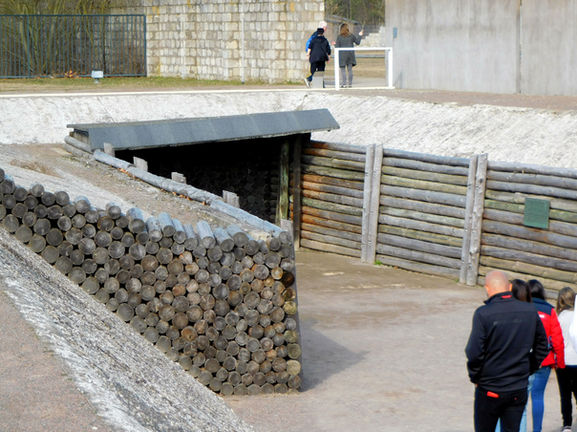Berlin and surroundings
Well known and almost unknown features
Down history lane: WW II
Memorial Estate Sachsenhausen
The town of Sachsenhausen lies 32 kilometers north-east of Berlin. Belonging to the jurisdiction of the picturesque city of Oranienburg, the current site has existed since 1300. A fort named "Neumühl" was first built at the confluence of the Havel river, flanked by a mill where the peasants of the area could market their products. In 1448, as part of the commercial route of the Hanseatic League, the Sachsenhausen lock was built to regulate river traffic in the region.
Until the first half of the 18th century, this was the main source of income for the local population. Of the fort, mill, 16th century village of weavers and the shipyard that emerged at the beginning of the 19th century, there are but historical records. No remnents of the first brewery built in Oranienburg exist either: it was here, where on March 22, 1933, after Hitler's "Seizure of Power", the first provisional concentration camp of the national socialist period was installed.
Until its official closure in July 1934, a total of 3,000 women and men were imprisoned. At least 16 of the inmates were killed by the guards in charge.
Two years later, in the summer of 1936, prisoners from other camps were forced to erect a new complex: the KZ Sachsenhausen. Since 1938, Sachsenhausen was not only a concentration camp but the "Administrative Central and General Inspection" of all "Reich" concentration camps and very soon, in the "Klinkerwerk" complex, subordinated to the main camp, the first place in German territory for the systematic extermination of prisoners.
More customized tours
in and around Berlin
-
Tempelhof Airport
-
Museum of the Luftwaffe
-
Russian Memorial Treptower Park
-
Memorial Estate Plötzensee
-
Forced Labor Camp Schöneweide
-
Military Citadel Wünsdorf
-
Memorial Estate German Resistance
-
Memorial Estate Köpenicker Bluttwoche
-
Memorial Estate SA Prison Papestraße
-
Memorial Estate Topographie des Terrors
-
More historical sites upon request


Down history lane: Cold War
Potsdam, the “craddle” of the Cold War
The current capital city of the federal state of Brandenburg – Potsdam – enters the history books in the form of a curious gift from Emperor Otto III. to his aunt, the abbess of Quedlinburg in the year 993. However, it is only after the incidents that occurred in its vicinity during two weeks in the summer of 1945, when the city entered the annals of Universal History: the framework for the difficult and tense negotiations during the "Berlin Conference" that made Potsdam the world famous "Cradle of the Cold War".
The idyllic setting, with historic connection between the former royal residences Berlin and Potsdam, has remained one of the most popular locations since the 18th century. As a consequence of the agreements reached at the end of the Treaty of Potsdam, which came into force after January 1946, the 4 "D's (Denazification, Demilitarization, Democratization, Decentralization of Germany) transform the localities of Klein Glienicke (on the Berlin side) and the "Berliner Vorstadt" (on the Potsdam side) in a "high security military zone" for the Allied and Soviet occupation troops.
From the first to the last moment of the so-called "Cold War", two old Prussian palaces, a secular bridge and a 19th century Italian style villa on the banks of lake Jungfernsee are listed as the "hottest spot" of the German division.
Starting from the area of Klein Glienicke, in the city limits between Berlin and Potsdam, walking through a part of the New Gardens complex this tour ends at the palace of Cecilienhof.
Optionally: a walk along the Villenkolonie Babelsberg (the accomodations of the russian, american and british delegations during the Potsdam Conference).
More customized tours
alongside the East-West borders:
-
The Wall Museum
-
Wall Memorial Bernauer Straße
-
Nordbahnhof Areal
-
Historical cemetery Invalidenfriedhof
-
Memorial Estate KGB Prison in Potsdam
-
Memorial Estates Stasi Central and Prison
-
The Wall Trail between Berlin and Potsdam
-
River cruises in the Spree and Havel rivers
Themed features:
unique places, selected venues
Art and museums
For those with special interests and the will to less traveled routes, to see what few achieve once in Berlin:
-
Museums Island (Museumsinsel)
-
Museum of German History
-
Kulturforum
-
German Museum of Technology
-
Bröhan Museum
-
Jewish Museum
-
Hamburger Bahnhof
-
Bauhaus Archiv
-
Urban Nation Museum
-
Boros Collection (Sammlung Boros)
-
More museums and art galleries upon request
Architecture
For students, professionals and anyone interested in the science of construction, the most varied styles converge in Berlin.
Hereby, some of the most outstanding examples:
Prussia - Throughout three centuries of building:
-
Citadel and historical center of Spandau (Zitadelle | Altstadt Spandau)
-
Old Berlin and Potsdam
-
Old Town and Castle of Köpenick
20th. Century – Bauhaus and Modernism in Berlin:
-
The Red Wall" of Neukölln (Hufeisensiedlung)
-
Housing Estate Karl-Marx-Allee Avenue
-
Garden Cities
-
Siemensstadt
-
Housing Estate Corbusierhaus
-
Hansaviertel Quarters
The New Architecture – From the fall of the wall to the present:
-
The "City West"
-
The “New City Center” (Neue Mitte)
-
The Diplomatic Quarters (Botschaftenviertel) in Tiergarten
-
The latest quarters and projects in town











